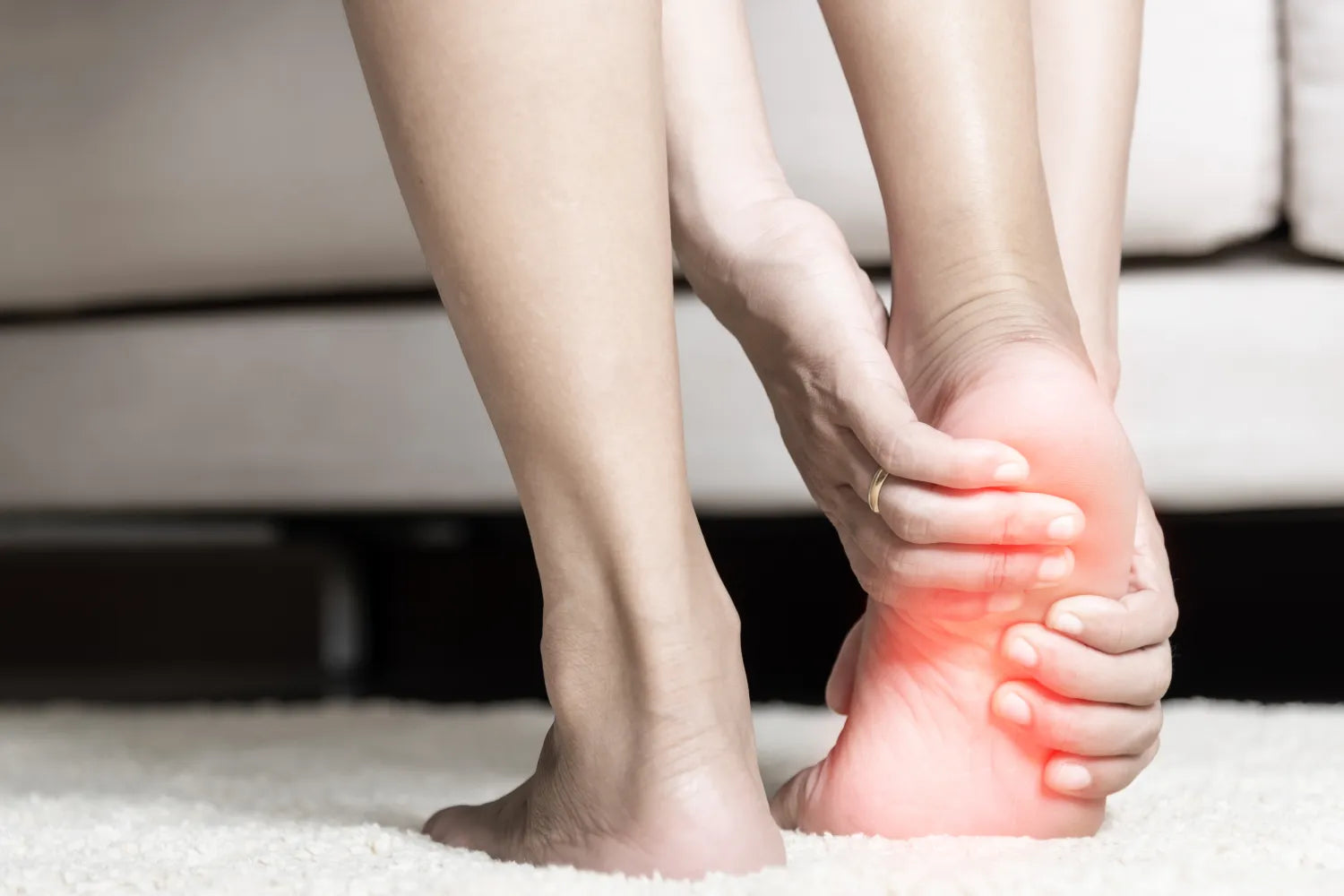
Waking up to foot pain can be a jarring start to the day. Whether it's a dull ache or a sharp sting, foot discomfort can make even the simplest tasks, like walking to the bathroom or making breakfast, a challenge. But why do your feet hurt when you wake up?
Understanding the causes of morning foot pain is the first step toward finding relief and regaining comfort. In this article, we'll delve into the anatomy of the foot, explore the common reasons for morning foot pain, and provide practical solutions to help you start your day on the right foot.
Why Is Understanding Foot Pain Important?
Our feet are the foundation of our mobility. They carry our weight, absorb shock, and keep us balanced as we go about our daily activities.
When our feet hurt, it can significantly impact our quality of life, making even the simplest tasks a challenge. Ignoring foot pain can lead to more serious issues over time, including chronic pain, mobility issues, and even impacts on our posture and other parts of the body.
Understanding foot pain is crucial to addressing it effectively. By identifying the cause of the discomfort, we can implement targeted solutions to alleviate the pain, prevent further issues, and improve overall foot health.
Your feet are as important as any other part of your body, and they deserve the same level of care and attention.
What Is the Anatomy of the Foot?
The foot is a complex structure made up of numerous bones, muscles, tendons, and ligaments, all working together to support movement and balance.
Let's take a closer look at the key components:
- Bones: The foot contains 26 bones, divided into three sections: the forefoot (including the toes and metatarsals), the midfoot (a collection of bones forming the foot's arch), and the hindfoot (the heel and ankle). Each bone plays a specific role in providing structure and stability to the foot.
- Muscles: There are over 20 muscles in the foot, each playing a specific role in movement and stability. These muscles allow us to walk, run, jump, and perform a variety of other movements. They also contribute to the foot's arch, which absorbs shock and supports the body's weight.
- Tendons: Tendons are fibrous tissues that connect muscles to bones. The most well-known tendon in the foot is the Achilles tendon, which connects the calf muscle to the heel bone and enables us to walk and run. Tendons absorb force and provide stability, allowing the foot to move in various directions.
- Ligaments: Ligaments are strong, elastic bands of tissue that connect bones to each other, providing stability to the foot. There are numerous ligaments in the foot, each contributing to its complex range of motion. Ligaments also protect the foot from injury by limiting excessive movement.
The intricate structure of the foot allows for a wide range of movements, but it also makes the foot vulnerable to pain and injury. Discomfort in the foot can often be traced back to issues in one or more of these components. For example, overuse or strain can lead to muscle fatigue or inflammation, while improper footwear can put pressure on certain bones, leading to discomfort.
With this knowledge, you can better understand why certain problems occur and how to prevent foot discomfort, leading to healthier feet and a more active lifestyle.
What Are the 5 Common Reasons Your Feet Might Hurt When Waking Up?
1. Poor Sleep Posture
The way you position your feet while sleeping can contribute to foot discomfort. If your feet are positioned awkwardly or are under strain for extended periods, it could lead to aches in the morning.
Copper Fit's compression socks may provide support to your feet, helping to maintain a more natural position during sleep. These socks are designed to provide a comfortable level of compression, which can help support your feet throughout the night.
2. Foot Overuse
Our feet carry our weight throughout the day, absorbing the impact of each step. Overuse from prolonged standing, walking, or running can lead to muscle fatigue and strain, which may result in morning foot pain.
Rest is crucial, as it allows your feet to recover from the day's activities. It's also important to consider balance in your activities, alternating between periods of activity and rest, to prevent overuse injuries.
3. Plantar Fasciitis
Plantar fasciitis, a condition that involves inflammation of the thick band of tissue that runs across the bottom of your foot, is a common cause of morning foot pain. This condition often results in a stabbing pain that usually occurs with your first steps in the morning.
Wearing supportive footwear, especially shoes with good arch support, can help manage the symptoms of plantar fasciitis. Additionally, specific stretching exercises can help alleviate the discomfort associated with this condition.
4. Achilles Tendonitis
Achilles tendonitis, an overuse injury of the Achilles tendon, can cause discomfort and stiffness along the back of the leg near the heel, especially in the morning. This can make those first steps out of bed particularly painful.
Stretching exercises and supportive gear, like Copper Fit's ankle sleeves, can help manage the discomfort and provide support to the affected area. It's also crucial to warm up before exercising and to increase the intensity of your workouts gradually to prevent such injuries.
5. Improper Footwear
The shoes you wear can significantly contribute to foot pain. Footwear that doesn't fit properly or fails to provide adequate support can put pressure on certain parts of the foot, leading to discomfort.
It's crucial to choose footwear that fits well and provides good support to maintain foot health. This includes not only your everyday shoes but also the shoes you wear for specific activities, such as running or hiking. Consider shoes with good arch support, a comfortable fit, and enough room for your toes to move.
By understanding these common causes of morning foot pain, you can take steps toward finding relief and improving your overall foot health. Every foot is unique, and what works for one person may not work for another. It's always best to listen to your body and seek professional help if your foot pain persists.
How Can You Manage Morning Foot Pain?
If morning foot pain is disrupting your daily routine, there are several steps you can take to manage the discomfort and improve your overall foot health:
- Stretching: Gentle stretching exercises can help alleviate foot pain by loosening tight muscles and improving flexibility. This could include toe stretches, calf stretches, or even yoga poses that focus on the feet and lower legs. Regularly incorporating these exercises into your morning routine can help reduce stiffness and discomfort.
- Proper Footwear: Wearing shoes that provide good arch support and fit properly can prevent foot pain. Avoid shoes that are too tight or loose, as they can cause pressure. It's also important to consider the type of shoe for specific activities. For example, investing in running shoes with adequate cushioning can help protect your feet from impact.
- Supportive Gear: Copper Fit's compression socks and ankle sleeves can provide support to your feet and ankles, helping maintain proper alignment and soothe discomfort. These products are designed to provide a comfortable level of compression, which can help support your feet throughout the day and during sleep.
- Rest: Incorporating rest periods into your day, especially if you've been on your feet for extended periods, can help prevent overuse injuries and reduce foot pain. This might mean taking short breaks during the day to elevate your feet, or ensuring you get a good night's sleep to allow your feet to recover from the day's activities.
- Hydration and Nutrition: Hydrating well and maintaining a balanced diet can also contribute to foot health. Certain nutrients are essential for muscle function and recovery, so make sure you're fueling your body with the right foods.
If your foot pain persists despite these changes, it might be time to consult a healthcare professional for a more personalized treatment plan. Persistent foot pain could be a sign of a more serious condition that needs medical attention.
Fighting Foot Pain, One Step at a Time
Understanding why your feet hurt when you wake up is crucial for finding effective solutions and improving your overall foot health. By paying attention to your sleep habits, footwear, and the health of your feet, you can prevent further discomfort.
Small adjustments, like introducing stretching exercises, choosing proper footwear, and using supportive gear like Copper Fit's compression socks, can make a significant difference. If your foot pain persists, don't hesitate to seek professional help.
At Copper Fit, we're committed to supporting your comfort and recovery, helping you start each day on the right foot.
Sources:
Journaling for Emotional Wellness | Rochester
Preventing Foot and Ankle Injuries | WashU Medicine
Foot health - Practice before pain | Colorado State
Plantar fasciitis: How is it treated and who’s at risk? | UC Davis





